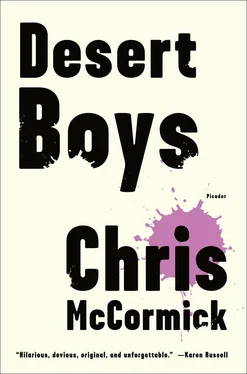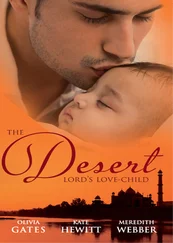“Take me home,” he said. “Let me meet your mom and dad.”
“I will,” I said. “I promise I will.”
THE END
The police arrested two nineteen-year-old boys (neither named Retivat) whose four homemade bombs — of which only two were set off — proved less effective than they’d planned. Now those boys were adults, forced to reconcile the perfection of what they’d imagined with the defectiveness of what they’d actually done. No one was killed, thankfully, though among the seventeen injured were Joshua Stilt and Jenna King. Both had checked out of the hospital with various degrees of burns and lacerations. I met with them at their apartment that night, just before heading back to BART.
“Well,” Jenna said. Her right arm was bandaged from the elbow to the wrist, and her nose ring had been — by choice or not, I didn’t ask — removed. To my surprise, she hugged me with her good arm. “At least this’ll give your article some pizazz. You might even win an award.”
The flowers Joshua had brought home from the man at the Mission Street BART station stood in a colorful Tiffany-style vase on the radiator. The day-old newspaper they’d come wrapped in had been thrown out, apparently, and now there was no way to tell the flowers apart from those purchased at an expensive boutique.
“I’m not sure I’m going to write the article after all,” I told them. Instead, my plan was to stop thinking so much about the past, to bring Lloyd home with me to the Antelope Valley. I wanted him to meet my father. I wanted to start our future. But that was another story.
If Joshua was disappointed by the news, he didn’t let on. He was sitting in the chair he’d been photographed in earlier that day, holding a plastic blue ice pack against his knee. He said, “What are you going to do with all your notes?”
“They’re yours,” I said, presenting my notebook. “If you want them.”
Joshua Stilt narrowed his eyes. He was in pain. “If I read them,” he asked, “will I find what I think I’ll find?”
I nodded.
Then he smiled — that smile — and told me exactly what I could do with these notes.
YOU’RE ALWAYS A CHILD WHEN PEOPLE TALK ABOUT YOUR FUTURE
We didn’t love the circumstances, but for the first time in years, my sister and I were home at the same time. Dad took a nap on the brown leather couch in front of the TV, and Jean and I tiptoed past him on our way to the kitchen like kids. We weren’t kids. In a month, Jean would be twenty-nine. She was an attorney but worked, in addition, for free. Pro bono. My dad, if awake, would have made his favorite joke on the subject: He’d always been, himself, pro-Cher.
At twenty-five, I wasn’t a kid either, but compared to the Mother Teresa persona Jean had wrapped around herself, I didn’t feel much like a contributing adult. A day earlier I’d called her that — Mother Teresa — when she’d told me about a community center she was planning for low-income survivors of domestic abuse. I said, “Damn. Mother Teresa over here.” She told me never to call her by that charlatan’s name again, and recommended the book by Hitchens.
My mom was in the kitchen, making coffee the Armenian way. When I’d left home for college, I discovered most people knew it as “Turkish” coffee, but in my house we knew the truth. The Turks had taken enough from us already. We drew the line at espresso.
Jean and I took seats at the kitchen table, an oak-top rectangle with white, ornate legs like a piano’s. Jean saw me noticing the legs of the table and mentioned how Victorian they were. I corrected her. “Victorians would have sawed these off,” I said. “Too lurid. Too ribald.”
My mom rubbed her head and made a joke about herself being too bald. The treatment had taken her hair and weight, but not her jokes.
That’s when we asked her to tell us a story.
Jean and I both knew Mom was getting impatient with us about starting families of our own. She was particularly frustrated with Jean, who had just ended her engagement to a physicist at Cornell. Mom hadn’t heard of Cornell before meeting Patrick, but after the breakup, she couldn’t help bringing up the school every time she heard something intelligent. As for me, I had time. An Armenian man — even a halfie like me — could claim his mother as his girl for as long as he wanted.
“Tell us a story,” my sister and I said, afraid silence would lead into another eulogy of Patrick.
“First, put on socks,” said my mom, turning from the countertop with two miniature cups of coffee. “On this cold floor? Go put on socks.”
When we got back to the kitchen, my mom had our coffee cups on the table. She said she didn’t have any stories to tell. “Ask Daley,” she said, gesturing to me. “He’s the writer.”
“I’m a blogger,” I said. Then, to improve my self-esteem: “And a freelance journalist.”
Jean said, “Emphasis on ‘free.’”
“Story,” my mom muttered to herself, fetching her own cup of coffee. “Story.” Then she took a seat at the table and started talking.
* * *
When my mom was a girl in Armenia, she’d eat apples until she grew sick. She and her older brother Gaspar practically lived in the apple tree outside their farmhouse in Kirovakan. The other brothers and sisters would leave them up there all day, until Raffy, the eldest, went out after sunset to talk them down. My mom blamed all her current dental trouble on those early days eating apple after apple after apple in the twilight.
She moved to New York at twenty-three, the first of her immediate family to emigrate. Nights she took English courses in Brooklyn. She feared the people in the subway, clutching the railings like weapons, until one day she didn’t. Nothing happened to signify the change — only time. Time replaced her fear with an immense loneliness. She missed her family and her country. In the Big Apple she missed her apple tree, and on the subway she cried and cried.
Eventually the rest of her family came to America, and she moved with them to Glendale, California. She worked in retail at the local mall. The mall security guard, a Midwestern transplant hoping to break into the movies, asked her to meet him for coffee. Jean and I knew this part of the story well. Our dad — the security guard with a head shot folded up in his back pocket.
While my mom and dad started dating, there was another man involved. An Armenian, a friend of Uncle Gaspar’s, named Armen. This was the first time Jean and I had heard about this other man. My mom said Armen definitely sold and probably used inordinate amounts of drugs. “Which drugs?” we asked. “Just drugs,” she said. “The bad kind.”
In any case, Armen — even though he’d never spoken to her, had seen her on only a handful of occasions — kept telling my uncle Gaspar how badly he wanted to marry my mom, how it was destined, how he’d do anything, anything, anything for her. My uncle, being of a certain generation of Armenian men, obliged. He told my mom to stop dating the white security guard so he could introduce her to his friend. It’s destined, he said, and it’s better that he’s one of us.
A few years earlier, my mom would have buckled. But remember: she’d lived in New York for two years by herself. She was not the same person she’d been before she left home. She wasn’t the girl her brother remembered, lounging in the limbs of an apple tree.
No, she said. I love Ed — my dad’s name — and I don’t want to meet anyone else.
My uncle must have hated her for making him return to his friend, tail between his legs, with a no. What kind of man lets his younger sister tell him what’s what? But they were in America now. The rules were different. What could he do?
Читать дальше












